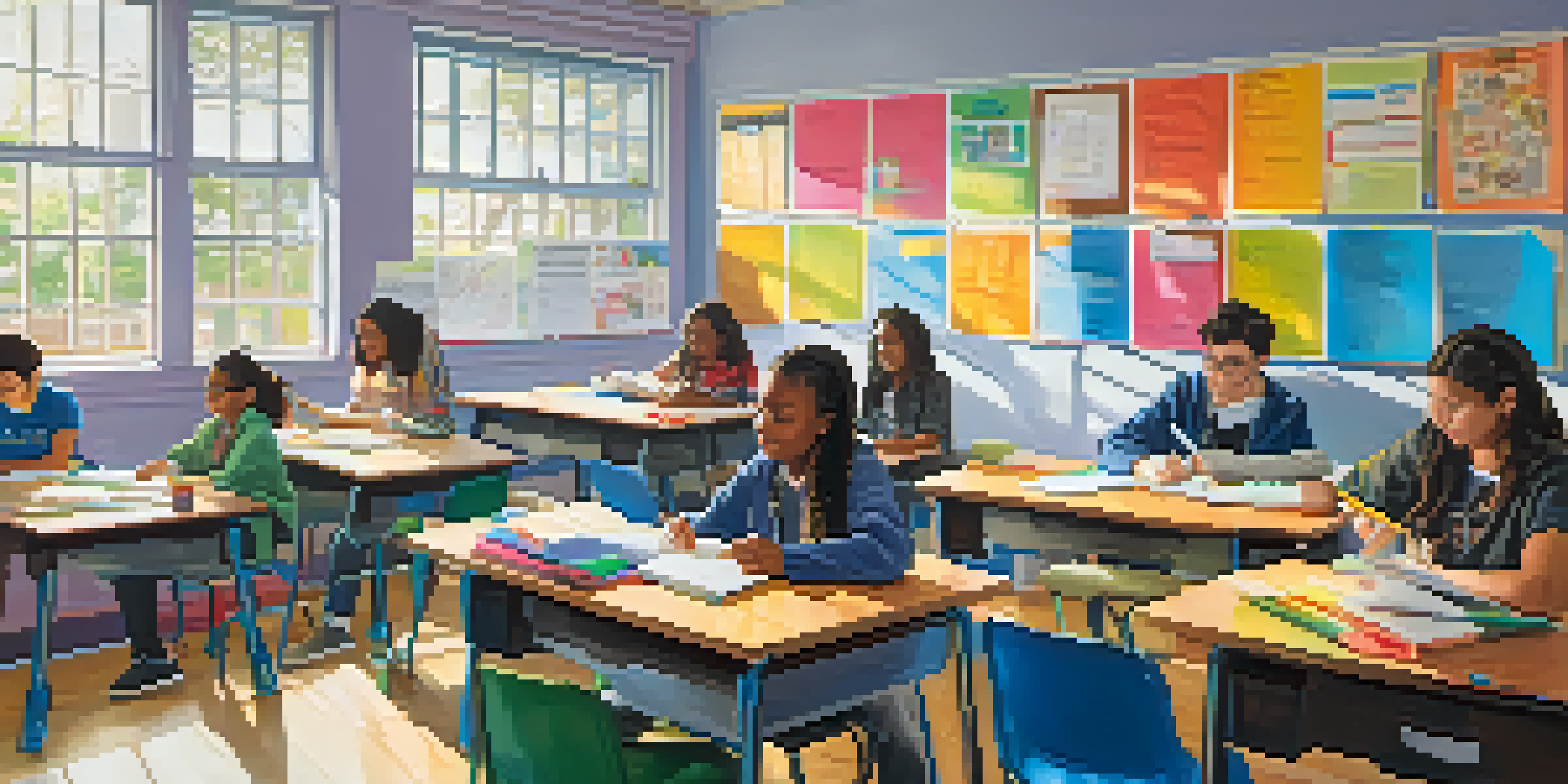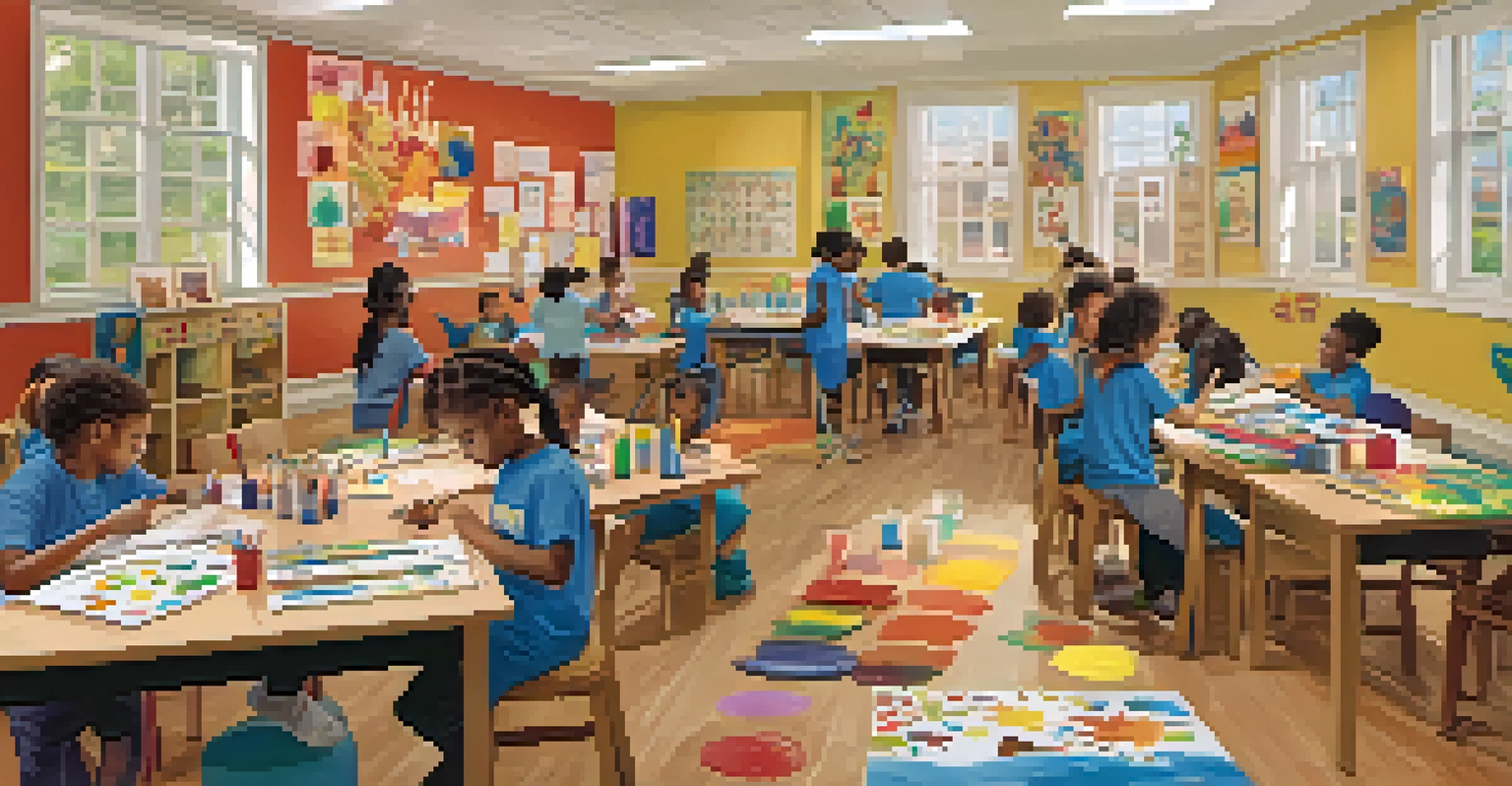Community Programs Supporting Education in Newark

Introduction to Newark's Educational Landscape
Newark, New Jersey, has a rich educational history, but like many urban areas, it faces challenges. From underfunded schools to socioeconomic barriers, the city is working hard to improve educational outcomes. Community programs have emerged as vital players in this transformation, providing support where it's needed most.
Education is the most powerful weapon which you can use to change the world.
These programs often serve as lifelines, offering resources, mentorship, and learning opportunities to students. They work to bridge the gaps that traditional education sometimes misses, ensuring that every child has access to the tools they need for success. Through collaboration with local schools and organizations, these initiatives are making a significant impact.
As we delve into Newark's community programs, we'll uncover the various ways these organizations are empowering students and their families. From tutoring services to after-school activities, these programs are not just filling gaps—they're building a brighter future for Newark.
Tutoring Programs: Personalized Academic Support
One of the most effective community programs in Newark focuses on tutoring, offering personalized academic assistance to students. These programs connect trained volunteers or educators with students who need extra help in subjects like math, reading, and science. The one-on-one support fosters a learning environment where students can thrive.

For instance, organizations like the Newark Public Library's Homework Help program provide resources and trained tutors to assist students with their assignments. This kind of tailored support can significantly boost students' confidence and academic performance. The success stories from these initiatives are numerous, showcasing how individualized attention can lead to remarkable improvements.
Community Programs Boost Education
Newark's community initiatives provide essential support through tutoring, after-school programs, and mentorship, significantly improving educational outcomes for students.
Moreover, these tutoring programs often incorporate technology and interactive learning methods, making education more engaging. By utilizing various teaching styles and resources, they cater to different learning preferences, ensuring that every student has the opportunity to excel.
After-School Programs: Safe Spaces for Learning
After-school programs play a crucial role in Newark's educational ecosystem by providing safe, supervised environments for children. These programs not only keep students engaged academically but also offer them a chance to socialize and develop important life skills. They often include a mix of homework help, sports, and creative activities.
The best way to find yourself is to lose yourself in the service of others.
For example, the Boys & Girls Club of Newark offers a range of after-school activities that promote personal growth and academic achievement. These programs help students stay on track while giving them the opportunity to explore their interests outside of the classroom. The structured environment encourages responsibility and teamwork.
In addition, after-school programs can help reduce the likelihood of risky behaviors by keeping students engaged in positive activities. By investing time in these programs, families and communities contribute to a supportive network that fosters children's overall development.
Mentorship Initiatives: Building Connections
Mentorship programs in Newark provide invaluable support to students by connecting them with caring adults. These relationships help guide young people through their academic journeys and personal challenges. Mentors often share their own experiences, offering insights that can inspire students to pursue their goals.
Organizations like Big Brothers Big Sisters of Essex, Hudson & Union Counties play a pivotal role in fostering these connections. By matching mentors with mentees based on shared interests and backgrounds, they create meaningful relationships that can last for years. The impact of mentorship extends beyond academics, influencing students' self-esteem and decision-making skills.
Family Engagement Enhances Learning
By involving families in the educational process, community programs strengthen parent-school connections, fostering a collaborative environment that benefits students.
Furthermore, mentorship programs often include workshops and group activities that promote personal development. These experiences build a sense of community and belonging, which is especially crucial for students facing various challenges in their lives.
Family Engagement: Strengthening Community Ties
Community programs in Newark recognize the importance of involving families in the educational process. By fostering strong parent-school connections, these initiatives create a support system that benefits students. Family engagement activities can include workshops, meetings, and social events aimed at promoting collaboration.
An example is the Newark Alliance, which hosts events designed to empower families with the knowledge and resources they need to support their children's education. By equipping parents with tools for advocacy and involvement, these programs help create a united front for student success. The involvement of families can significantly enhance a child's educational experience.
Additionally, these programs often facilitate communication between schools and families, ensuring that parents are informed about their children's progress. This transparency builds trust and encourages parents to take an active role in their children's education, reinforcing the idea that learning is a collective effort.
Technology Access: Bridging the Digital Divide
In today's digital age, access to technology is essential for educational success. Newark's community programs are actively addressing the digital divide by providing students with the necessary tools and resources. These initiatives ensure that all students have the opportunity to engage with technology and enhance their learning experiences.
Programs like Newark Digital Public Library offer free access to computers, internet, and digital literacy training. Such resources are vital for students who may not have reliable technology at home. By bridging this gap, these programs empower students to complete assignments, conduct research, and explore new learning opportunities.
Technology Access Bridges Gaps
Efforts to provide technology and digital literacy training in Newark are crucial for ensuring that all students can engage with modern learning resources.
Moreover, many community organizations are partnering with local businesses to provide devices and internet access to families in need. This collaborative approach not only equips students with technology but also encourages community involvement in education, fostering a culture of support and innovation.
Cultural Programs: Celebrating Diversity in Education
Cultural programs in Newark play a significant role in enhancing educational experiences by celebrating the city's diverse heritage. These initiatives expose students to various cultural perspectives, helping them appreciate their own identities and those of others. By integrating culture into education, these programs enrich the curriculum and promote inclusivity.
Organizations like the Newark Museum of Art offer educational programs that connect students with art, history, and science through a cultural lens. These experiences encourage students to think critically and creatively, fostering a love for learning. Cultural exposure can also inspire students to pursue careers in the arts and humanities.

Additionally, these programs often invite local artists and community leaders to share their stories and expertise, providing students with relatable role models. This connection between education and culture enhances students' engagement and motivation, creating a vibrant learning environment.
Conclusion: The Future of Education in Newark
As we explore the various community programs supporting education in Newark, it's clear that these initiatives are making a meaningful difference. By addressing academic needs, fostering mentorship, engaging families, and promoting cultural appreciation, these programs are shaping a brighter future for students. The collaboration between organizations, schools, and families creates a supportive network that empowers every child.
Looking ahead, continued investment in these community programs is crucial for sustaining this positive momentum. With ongoing support, Newark can further enhance educational opportunities and create a more equitable system for all students. The stories of success emerging from these initiatives serve as a testament to the power of community in education.
Ultimately, the commitment to education in Newark reflects the belief that every child deserves the opportunity to succeed. By nurturing talent and fostering a love for learning, these programs are not just transforming individual lives; they are contributing to the growth and vitality of the entire community.